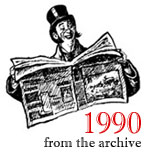
The Evolution of Liberation Theology
MOVING AWAY FROM MARXIST ANALYSIS
The savage killing of six Jesuit priests in El Salvador last November underscored once again the profound political implications of liberation theology. The most prominent of the priests, Ignacio Ellacuria, had written extensively on liberation themes before becoming rector of the Catholic university in San Salvador. The others in the group had worked on issues related to liberation theology’s option for the poor (human rights violations, education for the poor, etc.). Liberation theologian Jon Sobrino escaped assassination only because he was outside the country when the attack occurred.
Some critics of liberation theology see it as promoting Marxist revolution, and may have assumed the Jesuits in El Salvador were doing just that. But Ellacuria, who was perhaps the most politically involved of the group, had made his position quite clear. He called for a negotiated settlement to the violent conflict that has cost over 70,000 lives in his country. The FMLN guerrillas, Ellacuria wrote, could not claim to represent the will of the people of El Salvador, but they have expressed some of the aspirations of the majority: for land reform and an end to military oppression. The vast majority, Ellacuria believed, want peace together with a political and economic system that gives them some capacity to participate in shaping their lives. Ellacuria worked for these goals. The priests’ killers, enraged by renewed FMLN attacks, appear to have judged that anyone willing to dialogue and negotiate with such an enemy deserved death by reason of treason.
While news headlines only appear when such dramatic events occur, the political implications of liberation theology have stirred controversy from its inception to the present. Liberation theology takes many forms and includes divergent views on some points. My discussion focuses on Latin America and the theologians most commonly associated with liberation theology, such as Gustavo Gutierrez and Leonardo Boff. This liberation theology might be summarized under three main points:
(1) Liberation theology claims that the Bible clearly reveals a God concerned not simply with the salvation of souls but with creating a more just society where the poor are treated with dignity and share in the goods of the earth intended by God for all. In making this claim, liberation theologians draw upon various biblical sources: the Exodus story, prophetic denunciations of injustice, Jesus’ identification with the poor, his preaching of the Kingdom, and his conflicts with ruling authorities. Critics, in response, charge that liberation theology reduces faith to politics. They charge that it neglects personal sin, spiritual liberation, and grace, placing too much emphasis on structural sin, sociopolitical liberation, and human effort.
You May Also Enjoy
In recent years Croatia has received much attention in the Western press for its politics…
For a person with a strong social conscience, chastity is a mature response to a great evil. It is a form of rebellion.
Globalization of the economy could be halted or at least significantly modified so that the people of the world, rather than corporate interests, will benefit.

